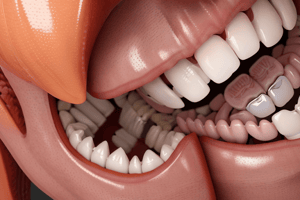Podcast
Questions and Answers
Which of the following is NOT a function of primary dentition?
Which of the following is NOT a function of primary dentition?
- Formulation of speech
- Chewing (mastication)
- Support for the lips and teeth
- Support for permanent tooth eruption (correct)
Permanent teeth are larger and less whiter in color compared to primary teeth.
Permanent teeth are larger and less whiter in color compared to primary teeth.
True (A)
Which numbering system is primarily used in the United States?
Which numbering system is primarily used in the United States?
- Universal/National system (correct)
- FDI system
- Palmer system
- International system
What is the surface of the tooth that is in contact with the cheeks called?
What is the surface of the tooth that is in contact with the cheeks called?
A dental abscess is defined as a collection of pus due to a viral infection.
A dental abscess is defined as a collection of pus due to a viral infection.
The surface of the tooth furthest away from the midline is called the ______.
The surface of the tooth furthest away from the midline is called the ______.
What is a bridge in dental terminology?
What is a bridge in dental terminology?
In the FDI system, the teeth are coded using a _____ system.
In the FDI system, the teeth are coded using a _____ system.
Match the tooth surfaces with their definitions:
Match the tooth surfaces with their definitions:
Match the following dental terms with their correct definitions:
Match the following dental terms with their correct definitions:
What is the primary reason for dental charting?
What is the primary reason for dental charting?
Which of the following is NOT a type of crown material?
Which of the following is NOT a type of crown material?
Charting is unnecessary in dental practices and holds no importance.
Charting is unnecessary in dental practices and holds no importance.
The Palmer System uses bracket shapes to indicate the quadrant of the mouth.
The Palmer System uses bracket shapes to indicate the quadrant of the mouth.
What term describes the surface of the upper teeth in contact with the palate?
What term describes the surface of the upper teeth in contact with the palate?
What is a diastema?
What is a diastema?
Flashcards are hidden until you start studying
Study Notes
Tooth Morphology
- The tooth is comprised of enamel, dentin, pulp, cementum, and periodontal ligament.
- The crown is the visible portion above the gum line.
- The root is the portion embedded in the jawbone.
- The pulp is the core of the tooth, containing nerves and blood vessels.
Primary Teeth
- Smaller in size than permanent teeth
- Whiter in color than permanent teeth
- Less mineralized, therefore may become more worn
- Functions include chewing, supporting lips and teeth, speech formulation, and maintaining arch space for secondary teeth.
Secondary Teeth
- Larger in size than primary teeth
- More mineralized than primary teeth
- Functions include chewing, speech formulation, and maintaining arch space for secondary teeth.
Mixed Dentition
- The transitional period between primary and secondary teeth
- Begins around age 6
Tooth Surfaces
- Mesial: Surface closest to the midline of the dental arch
- Distal: Surface farthest from the midline of the dental arch
- Buccal: Surface of teeth in contact with the cheeks.
- Labial: Surface of teeth in contact with the lips.
- Lingual: Surface of lower teeth in contact with the tongue.
- Palatal: Surface of upper teeth in contact with the palate.
- Occlusal: Biting surface of posterior teeth
- Incisal: Biting/cutting surface of anterior teeth
- Proximal: Surface of the tooth in contact with adjacent teeth (mesially or distally).
Eruption Dates
- Primary Teeth: Erupt between 6-30 months, lost around 6-12 years
- Permanent Teeth: Erupt around 6 years for first molars, continue erupting until around 25 years.
Charting Systems
- FDI System: Used in Canada, Europe, and most other countries, including South Africa. Each tooth is assigned a two-digit number, first digit representing the quadrant, second representing the tooth.
- Universal/National System: Used in the United States. Teeth are numbered from 1 to 32 (permanent) or A to T (primary).
- Palmer System: Uses a quadrant bracket system and numbers (permanent) or letters (primary) to identify each tooth.
Charting Terms
- Abscess: A collection of pus due to a bacterial infection.
- Crowns: A "cap" placed over the tooth, often made of gold, porcelain, or stainless steel.
- Bridge: A prosthetic device used to replace a missing tooth. Abutments are the parts attached to the existing teeth.
- Denture: A prosthetic device used to replace missing teeth. Partial dentures replace some teeth. Full dentures replace all teeth.
- Diastema: A space between two adjacent teeth, most commonly seen between the maxillary central incisors.
- Drifting: The movement of tooth position due to the loss of adjacent teeth.
Studying That Suits You
Use AI to generate personalized quizzes and flashcards to suit your learning preferences.




